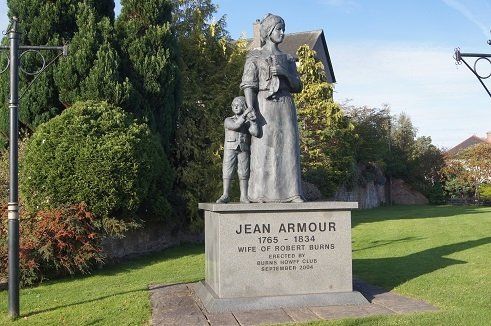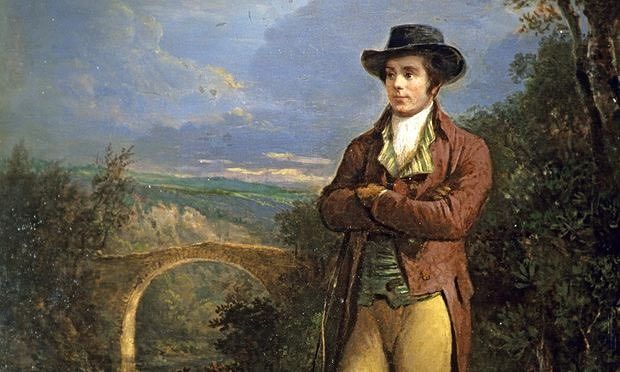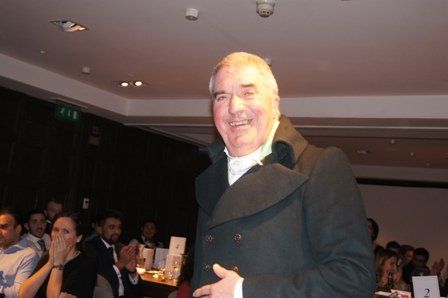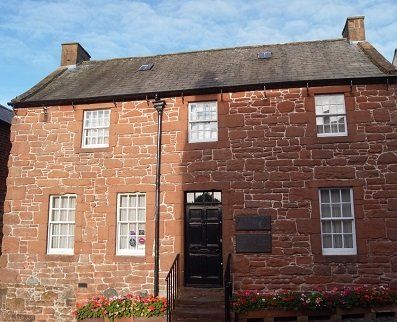Holy Willie's Prayer
The Background
This is one of Robert Burn's best known and best loved works and it even vies with Tam O'Shanter as a Burns Supper favourite. In fact if you weren't treated to a rendition of at least one of these two masterpieces at your celebration of the bard, then you might have the right to feel a bit short-changed.
The poem is widely acknowledged to be Burns' finest satirical work and is an excoriation of Calvinistic hypocrisy as exemplified by the Holy Willie of the title. It lambasts a certain William Fisher of the Ayrshire town of Mauchline, who along with the parish minister William (Daddy) Auld had accused Burns' friend Gavin Hamilton of embezzlement from the parish poor fund. The accusation itself was vexatious, vindictive and baseless. Hamilton's defence was that the so called missing funds didn't exist because the parishioners who should have contributed the money were themselves too poor to do so. The Kirk Session found in Hamilton's favour so Fisher and Auld next accused Hamilton of failing to properly observe the Sabbath. Hamilton appealed to the Presbytery of Ayr and won his case along with a subsequent appeal brought by Auld and Fisher to the Synod of Glasgow and Ayr.
Holy Willie was a firm believer in the Calvinist doctrine of Double Predestination, where God has decreed from the beginning of time which men are predestined to spend the eternal afterlife in either heaven or hell. Only a chosen few would enjoy salvation, whilst the vast majority would spend eternity in hell, even if their only sin was the original one of Adam. By contrast, those whom God had predestined to spend the afterlife in heaven would do so regardless of any sins they committed during their time on earth. This dogma was adhered to by the more traditional members of the Kirk, known as the Auld Lichters and in Mauchline, the minister William Auld, as well as William Fisher, the subject of the poem, were firmly in this more orthodox camp. They were bitterly opposed to the other bloc in the kirk, known as the New Lichters, who took, by the standards of the day, a more enlightened interpretation of their religion.
New Lichters included both Gavin Hamilton and Burns himself and it was this difference in views that in all likeliness drove Auld and Fisher to take the action against Hamilton in the first place.
In the course of the poem Holy Willie reveals himself to be a drinker and a fornicator, and this was reflected in real life when in October 1790 he himself had to stand before Daddy Auld to receive a withering rebuke for his own drunkenness. In February 1809 he was found dead in a ditch near Mauchline, apparently having become the worse for drink.
Fisher, or Holy Willie, as Burns dubbed him, was the type of man that he would have despised with a vengeance, and that is what he took when he wrote these lines in 1785 in the aftermath of the case.
The Poem
Holy Willie's Prayer is written in the verse form standard Habbie, which consists of stanzas of six lines with the first, second, third and fifth having eight syllables and all rhyming with each other. The fourth and sixth lines, which also rhyme with each other, are shorter, with lines of four syllables, although when necessity demanded Burns was not averse to slipping in a fifth, as he does in the first verse:
O Thou, that in the heavens does dwell,
Wha, as it pleases best Thysel'
Sends ane to heaven and ten to hell,
A' for thy glory,
And no for onie guid or ill
They've done afore thee
Willie, of course, is of the belief that he is one of the few destined for salvation and the next few verses are dedicated to him, in the course of his prayer, recounting how he rises above other men in his virtue and adherence to an exemplary lifestyle:
O Lord, Thou kens what zeal I bear,
When drinkers drink, an' swearers swear
And singing here, an' dancing there,
Wi' great and sma'.
For I am keepit by Thy fear
Free frae them a'.
The poem continues by revealing Willie as a hypocrite when he confesses in his prayer that he is a drunkard and a fornicator:
O lord! yestreen, Thou kens, wi Meg -
Thy pardon I sincerely beg;
O! may't never be a livin plague
To my dishonour
An' I'll ne'er lift a lawless leg
Again upon her.
Besides I further maun allow,
Wi' Leezie's lass three times I trow -
But Lord, that Friday I was fu'
When I cam near her;
Or else Thou kens, Thy servant true
Wad never steer her.
Willie again calls on God's blessing, reminding Him that he is one of the Lord's chosen few before the poem develops into a rant, with Willie calling on the Almighty to condemn firstly Gavin Hamilton for standing up against the accusations against him, winning the case, and making Willie a figure of ridicule.
Lord, mind Gaw'n Hamilton's deserts;
He drinks and swears and plays at cartes.
Yet has so mony takin airts,
Wi' great and sma',
Frae God's ain priest the people's hearts
He steals awa.
An when we chastened him therefor,
Thou kens how he bred sic a splore,
An' set the world in a roar
O' laughing art us;-
Curse Thou his basket and his store,
Kale an' potatoes.
Willie then proceeds to ask for God's condemnation of the Presbytery of Ayr who found in Hamilton's favour before embarking on a plea to condemn Robert Aiken, Hamilton's counsel at the proceedings as well as Hamilton himself to eternal damnation at the last judgement.
Lord, in thy day of vengeance try him,
Lord visit them wha did employ him,
and pass not in thy mercy by them,
Nor hear their prayer,
But for Thy people's sake destroy them,
An' dinna spare.
The poem concludes with Willie calling again for God to bless him with riches and social standing in this life and rewards in the next. In return Willie tells God that He can have the credit.
But Lord, remember me and mine,
Wi' mercies temporal and divine,
That I for grace and gear may shine,
Excell'd by nane,
And a' the glory shall be thine,
Amen, Amen!
When Hamilton and his Counsel, Robert Aiken, saw the poem they thought it was hilarious but the traditionalists in the kirk, however, were not amused and it was not published until 1789, four years after it was written, thus missing out on the Kilmarnock edition of Poems Written Chiefly in the Scottish Dialect.



